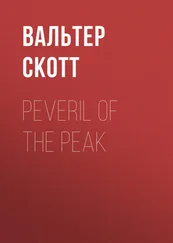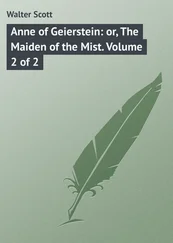Walter Scott - Peveril of the Peak
Здесь есть возможность читать онлайн «Walter Scott - Peveril of the Peak» весь текст электронной книги совершенно бесплатно (целиком полную версию без сокращений). В некоторых случаях можно слушать аудио, скачать через торрент в формате fb2 и присутствует краткое содержание. Жанр: Исторические приключения, на английском языке. Описание произведения, (предисловие) а так же отзывы посетителей доступны на портале библиотеки ЛибКат.
- Название:Peveril of the Peak
- Автор:
- Жанр:
- Год:неизвестен
- ISBN:нет данных
- Рейтинг книги:4 / 5. Голосов: 1
-
Избранное:Добавить в избранное
- Отзывы:
-
Ваша оценка:
- 80
- 1
- 2
- 3
- 4
- 5
Peveril of the Peak: краткое содержание, описание и аннотация
Предлагаем к чтению аннотацию, описание, краткое содержание или предисловие (зависит от того, что написал сам автор книги «Peveril of the Peak»). Если вы не нашли необходимую информацию о книге — напишите в комментариях, мы постараемся отыскать её.
Peveril of the Peak — читать онлайн бесплатно полную книгу (весь текст) целиком
Ниже представлен текст книги, разбитый по страницам. Система сохранения места последней прочитанной страницы, позволяет с удобством читать онлайн бесплатно книгу «Peveril of the Peak», без необходимости каждый раз заново искать на чём Вы остановились. Поставьте закладку, и сможете в любой момент перейти на страницу, на которой закончили чтение.
Интервал:
Закладка:
Yet this custom, however recommended by state policy, must have often struck chill upon the heart of the criminal, who thus, stolen, as it were, out of society, reached the place of his confinement, without encountering even one glance of compassion on the road; and as, from under the dusky arch, he landed on those flinty steps, worn by many a footstep anxious as his own, against which the tide lapped fitfully with small successive waves, and hence looked forward to the steep ascent into a Gothic state prison, and backward to such part of the river as the low-brow'd vault suffered to become visible, he must often have felt that he was leaving daylight, hope, and life itself, behind him.
While the warder's challenge was made and answered, Peveril endeavoured to obtain information from his conductors where he was likely to be confined; but the answer was brief and general—"Where the Lieutenant should direct."
"Could he not be permitted to share the imprisonment of his father, Sir Geoffrey Peveril?" He forgot not, on this occasion, to add the surname of his house.
The warder, an old man of respectable appearance, stared, as if at the extravagance of the demand, and said bluntly, "It is impossible."
"At least," said Peveril, "show me where my father is confined, that I may look upon the walls which separate us."
"Young gentleman," said the senior warder, shaking his grey head, "I am sorry for you; but asking questions will do you no service. In this place we know nothing of fathers and sons."
Yet chance seemed, in a few minutes afterwards, to offer Peveril that satisfaction which the rigour of his keepers was disposed to deny to him. As he was conveyed up the steep passage which leads under what is called the Wakefield Tower, a female voice, in a tone wherein grief and joy were indescribably mixed, exclaimed, "My son!—My dear son!"
Even those who guarded Julian seemed softened by a tone of such acute feeling. They slackened their pace. They almost paused to permit him to look up towards the casement from which the sounds of maternal agony proceeded; but the aperture was so narrow, and so closely grated, that nothing was visible save a white female hand, which grasped one of those rusty barricadoes, as if for supporting the person within, while another streamed a white handkerchief, and then let it fall. The casement was instantly deserted.
"Give it me," said Julian to the officer who lifted the handkerchief; "it is perhaps a mother's last gift."
The old warder lifted the napkin, and looked at it with the jealous minuteness of one who is accustomed to detect secret correspondence in the most trifling acts of intercourse.
"There may be writing on it with invisible ink," said one of his comrades.
"It is wetted, but I think it is only with tears," answered the senior. "I cannot keep it from the poor young gentleman."
"Ah, Master Coleby," said his comrade, in a gentle tone of reproach, "you would have been wearing a better coat than a yeoman's to-day, had it not been for your tender heart."
"It signifies little," said old Coleby, "while my heart is true to my King, what I feel in discharging my duty, or what coat keeps my old bosom from the cold weather."
Peveril, meanwhile, folded in his breast the token of his mother's affection which chance had favoured him with; and when placed in the small and solitary chamber which he was told to consider as his own during his residence in the Tower, he was soothed even to weeping by this trifling circumstance, which he could not help considering as an omen, that his unfortunate house was not entirely deserted by Providence.
But the thoughts and occurrences of a prison are too uniform for a narrative, and we must now convey our readers into a more bustling scene.
CHAPTER XXXVII
Henceforth 'tis done—Fortune and I are friends;
And I must live, for Buckingham commends.
The spacious mansion of the Duke of Buckingham, with the demesne belonging to it, originally bore the name of York House and occupied a large portion of the ground adjacent to the Savoy.
This had been laid out by the munificence of his father, the favourite of Charles the First, in a most splendid manner, so as almost to rival Whitehall itself. But during the increasing rage for building new streets, and the creating of almost an additional town, in order to connect London and Westminster, this ground had become of very great value; and the second Duke of Buckingham, who was at once fond of scheming, and needy of money, had agreed to a plan laid before him by some adventurous architect, for converting the extensive grounds around his palace into those streets, lanes, and courts, which still perpetuate his name and titles; though those who live in Buckingham Street, Duke Street, Villiers Street, or in Of-alley (for even that connecting particle is locally commemorated), probably think seldom of the memory of the witty, eccentric, and licentious George Villiers, Duke of Buckingham, whose titles are preserved in the names of their residence and its neighbourhood.
This building-plan the Duke had entered upon with all the eagerness which he usually attached to novelty. His gardens were destroyed—his pavilions levelled—his splendid stables demolished—the whole pomp of his suburban demesne laid waste, cumbered with ruins, and intersected with the foundations of new buildings and cellars, and the process of levelling different lines for the intended streets. But the undertaking, although it proved afterwards both lucrative and successful, met with a check at the outset, partly from want of the necessary funds, partly from the impatient and mercurial temper of the Duke, which soon carried him off in pursuit of some more new object. So that, though much was demolished, very little, in comparison, was reared up in the stead, and nothing was completed. The principal part of the ducal mansion still remained uninjured; but the demesne in which it stood bore a strange analogy to the irregular mind of its noble owner. Here stood a beautiful group of exotic trees and shrubs, the remnant of the garden, amid yawning common-sewers, and heaps of rubbish. In one place an old tower threatened to fall upon the spectator; and in another he ran the risk of being swallowed up by a modern vault. Grandeur of conception could be discovered in the undertaking, but was almost everywhere marred by poverty or negligence of execution. In short, the whole place was the true emblem of an understanding and talents run to waste, and become more dangerous than advantageous to society, by the want of steady principle, and the improvidence of the possessor.
There were men who took a different view of the Duke's purpose in permitting his mansion to be thus surrounded, and his demesne occupied by modern buildings which were incomplete, and ancient which were but half demolished. They alleged, that, engaged as he was in so many mysteries of love and of politics, and having the character of the most daring and dangerous intriguer of his time, his Grace found it convenient to surround himself with this ruinous arena, into which officers of justice could not penetrate without some difficulty and hazard; and which might afford, upon occasion, a safe and secret shelter for such tools as were fit for desperate enterprises, and a private and unobserved mode of access to those whom he might have any special reason for receiving in secret.
Leaving Peveril in the Tower, we must once more convey our readers to the Levee of the Duke, who, on the morning of Julian's transference to that fortress, thus addressed his minister-in-chief, and principal attendant: "I have been so pleased with your conduct in this matter, Jerningham, that if Old Nick were to arise in our presence, and offer me his best imp as a familiar in thy room, I would hold it but a poor compliment."
Читать дальшеИнтервал:
Закладка:
Похожие книги на «Peveril of the Peak»
Представляем Вашему вниманию похожие книги на «Peveril of the Peak» списком для выбора. Мы отобрали схожую по названию и смыслу литературу в надежде предоставить читателям больше вариантов отыскать новые, интересные, ещё непрочитанные произведения.
Обсуждение, отзывы о книге «Peveril of the Peak» и просто собственные мнения читателей. Оставьте ваши комментарии, напишите, что Вы думаете о произведении, его смысле или главных героях. Укажите что конкретно понравилось, а что нет, и почему Вы так считаете.








